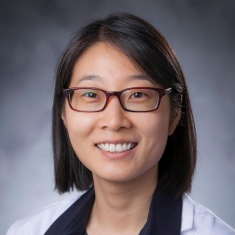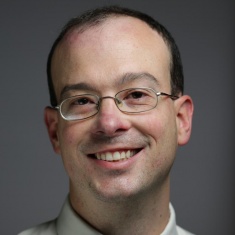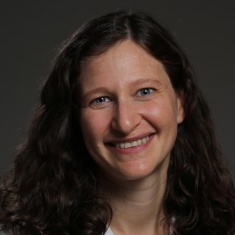Their trainee days are behind them, but they’re still too young to be considered senior scientists. They are the young investigators in the Division of Rheumatology. We profile three rheumatologists who are devoted to their patients, their profession, and their research, and explore how the Division is nurturing them during their early careers.
Kai Sun, MD
Dr. Sun started in the Division of Rheumatology and Immunology in August 2017 after completing her fellowship in rheumatology at the Hospital for Special Surgery and Weill Cornell Medicine. She was attracted to the Division by the opportunity to be involved in research and teaching in addition to seeing patients. “It is definitely a privilege to be part of the Rheumatology Division,” she said. “People, both patients and physicians in the community, have high expectations of the care at Duke—that we can offer them hope when other places cannot.”
She splits her time equally between clinical care and her research, which focuses on medication adherence, specifically in lupus patients. “Seeing the negative effect of missing medications in lupus patients sparked my interest in doing this kind of research,” she noted, “because most of the rheumatologic conditions are chronic autoimmune diseases that require long-term treatments with medications.” She is working to find ways to improve the clinical encounter in order to promote adherence.
She was first attracted to rheumatology in medical school at the Washington University School of Medicine, where she received her MD in 2011. She saw that rheumatologists dealt with rarer diseases that can affect every organ in the body. She found it fascinating that patients would present with seemingly random, unrelated symptoms, and the rheumatologist would be able to put them together to make a diagnosis. She also enjoys the more deliberate pace of rheumatology, where there are fewer emergencies. “I like to take time to think about a problem, and rheumatology is one of those fields where you deal with complex problems, but you often have time to think about them,” she observed. She finds the intellectual challenges and the medical puzzles stimulating. “When patients come in, they have various symptoms that other doctors had not put together into a diagnosis, but we can make those connections. Being an expert in something and being able to help people with my expertise are definitely rewarding.”
Those thoughts are reflected in Sun’s advice to the younger generation of rheumatologists. “Find something that bugs you, and try to fix it, whatever it may be.”
Stephen Balevic, MD
Assistant Professor of Pediatrics
Assistant Professor of Medicine
Member, Duke Clinical Research Institute
Dr. Balevic is an adult and pediatric rheumatologist who cares for patients with a wide variety of autoimmune and rheumatic diseases. He is also a clinical researcher focusing on precision medicine, clinical pharmacology and drug testing. After earning his MD at Marshall University in 2010, he came to Duke in 2014 and completed a four-year fellowship specializing in both adult and pediatric rheumatology, which is relatively unusual among rheumatologists. He joined the faculty in 2018.
Balevic is enthusiastic about the field and what attracted him to it. He values the continuity of contact with patients who have chronic diseases, getting to know them and their families over a long period of time. He is excited about the explosion of new medicines on the market that have brought significant improvements to patients’ conditions. “Now, our goal is to treat most of the patients so that they achieve remission—a major paradigm shift,” he said. Rheumatologists are now able to make many patients with lifelong diseases feel better, and in many cases, help them live longer. He also enjoys the complexity of the rheumatologic diseases, which often affect multiple body systems, allowing a holistic approach to care.
Balevic spends 75 percent of his time on clinical research, splitting the other 25 percent between seeing adult and pediatric patients in the hospital and the outpatient setting. His specific area of research interest is clinical pharmacology and drug trials. As a member of the Duke Clinical Research Institute, he works on a number of clinical trials, involving both pediatric and adult patients. He is also currently pursuing additional training as a PhD candidate in pharmaceutical sciences at the UNC School of Pharmacy, as well as working in a training position at the U.S. Food and Drug Administration.
He feels that to be a good researcher, you must first be a good clinician. “Otherwise you don’t know the right questions to ask,” he noted. And the reverse is true. “To be a good clinician, you have to be a good researcher, because if you’re not keeping up with the latest information and data, you’re not offering patients the best care out there.”
He thinks that opportunities for collaboration both within and external to the Division are a major strength at Duke. “We get to collaborate with other people, and it’s really amazing to see a patient get better not only with the time you take with them, but with the entire team that comes with you,” he said. “That’s a really cool thing about being a rheumatologist and being at Duke.”
Balevic had lofty thoughts for future rheumatologists.
“We are very, very blessed to be physicians, and along with that, we have a responsibility. It should always be to serve our patients, and that may mean to always do the best you can. Always continue learning whenever possible, continue reading, continue studying, and listen to your patients when they talk to you.
It’s a calling that we’re all very blessed to be part of, and just use that calling to really serve the patient.”
Rebecca Sadun, MD, PhD
Assistant Professor of Medicine
Assistant Professor of Pediatrics
Dr. Sadun is also an adult and pediatric rheumatologist who trained at Duke, completing combined fellowship in 2018. She earned her MD at the Keck School of Medicine at the University of Southern California in 2010 and her PhD in cancer immunology from the same institution in 2007.
During her training, she became intrigued by why the immune system sometimes attacks the body, instigating an interest in rheumatology . She enjoys several aspects of clinical rheumatology, stating, “Not only do we get to play a part in helping to solve some of what others might consider to be medical mysteries,” she said, “but we get to develop longstanding relationships with our patients and help them as they develop strategies to cope with living with chronic disease.”
Her devotion to her patients leads her to work both in clinical care and in research. She observed that clinical care tends to provide instant gratification, with the opportunity to help the individual patient here and now. Research, on the other hand, provides delayed gratification, with the opportunity to contribute to the body of knowledge that will improve treatments of the severe diseases the rheumatologist addresses, some of which are still without effective therapies.
She conducts translational B cell research in lupus, looking particularly at differences in B cell biology between pediatric-onset and adult-onset lupus. She is also developing curricula to teach fellows to help young adults as they move from pediatric to adult rheumatology care, and she holds a grant to evaluate the impact of various curricular approaches.
Dr. Sadun is also establishing a dedicated Young Adult Rheumatology Clinic, which will serve clinical, educational, and research missions.
“We know that patients who are transitioning from pediatric to adult care often do worse following their transfer,” she explained. “This clinic provides the opportunity to have young adults receive young adult wraparound care with expertise in mental health, contraception, and primary care. We will study whether this can improve transition outcomes.”
The concentrated patient population will also lend itself to research on issues specific to the age group, such as medication adherence and age-particular manifestations of autoimmune diseases. Ultimately, as her career progresses she would like to develop the Young Adult Rheumatology Clinic into a Young Adult Center of Excellence, including other subspecialties.
She finds the Division to be vibrant and ever-growing. “It has been a pleasure to watch each of the [Division’s] dimensions continue to grow and expand, whether it’s clinical care, or specialized care such as physicians with extra expertise in ultrasound, or research in a wide variety of areas,” she said.
She tells young investigators entering the field to not lock in on a single approach to research. Instead, “they should essentially follow the science and stay nimble, being able to move with the data and move with opportunities for collaboration.”
This article was written by Ernie Hood, a freelance writer and science podcaster in North Carolina.


